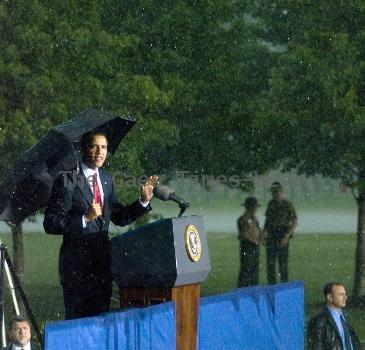Dems look for best way to exploit Barton’s apology to BP for their own political gain
By David Espo, APWednesday, June 23, 2010
Dems exploit Barton apology to BP in election push
WASHINGTON — In need of political momentum, Democrats are exploiting Republican Rep. Joe Barton’s startling apology to Gulf oil spiller BP for its treatment by the Obama administration, launching a steady, low-budget campaign of fundraising appeals, a pair of television commercials and Web ads.
Little more than four months before midterm elections, party officials appear to be testing ways to maximize the gain from an episode that ricocheted across the Capitol at a furious pace last week, and that Republicans deemed significant enough to force Barton to recant his remarks.
Democratic officials have yet to invest heavily in an effort to reap political benefit from a controversy that stems from the devastating spill. And while senior Democrats say voters can expect to see Barton’s apology over and over this fall, it is not clear what the ultimate impact of the episode will be on a campaign dominated by economic and unemployment concerns.
Already, hundreds of miles from the Gulf Coast, Minnesota State Sen. Tarryl Clark has become the first Democratic candidate to incorporate the issue into a television ad. In it, she quotes Rep. Michele Bachmann as saying calls for BP to pay cleanup costs amounted to “extortion … She has said, ‘If I was the head of BP I would let the signal get out there, we’re not going to be chumps,’” Clark says of her opponent.
Bachmann, an outspoken conservative seeking her third term, said the charges are untrue. “Making false claims and distortions about my statements is indicative of a negative campaign style, and Minnesotans deserve better,” she said in a written statement.
For his part, Barton apologized to fellow Republicans at a closed-door meeting on Wednesday for any difficulty he had caused them. They, in turn, allowed him to remain the senior member of the House Energy and Commerce Committee.
The controversy over a recanted apology flared at a time when Democrats face the prospect of heavy election losses in both the Senate and House this fall. In a variety of polls, voters report they are unhappy at a time of high unemployment and eager for change. A surge in support the administration had hoped for after passage of health care legislation has yet to materialize, and independents, particularly, show signs of abandoning the Democrats this fall after propelling them to victories in 2006 and 2008.
Doug Heye, a spokesman at the Republican National Committee, said the Democratic focus on the apology marked an attempt to shift the voters’ attention away the economy. “Since Democrats can’t talk about job creation and can’t talk about President Obama’s failure for weeks to meet with BP officials, they are desperate to talk about anything else,” he said.
“I apologize,” Barton said nearly a week ago to BP CEO Tony Hayward, who was sitting at a witness table at a nationally televised congressional hearing into the worst oil spill in the nation’s history. “I do not want to live in a country where any time a citizen or a corporation does something that is legitimately wrong is subject to some sort of political pressure that is — again, in my words, amounts to a shakedown,” the Texan said. “So I apologize.”
Republican House leaders swiftly issued a statement disagreeing with Barton. Threatened with the loss of his seniority, the Texas lawmaker withdrew his apology.
In the days since, Democrats have seized on any development to generate additional coverage of the controversy, highlighting messages from Barton’s Twitter account, for example. They have gradually turned from simply criticizing Barton to making the case that he is far from a lone voice, essentially seeking to rebrand the entire Republican Party in his image.
The Democratic National Committee-sponsored television commercial that aired early in the aftermath of the apology focused entirely on Barton and called the Texas Republican “the guy who would be in charge” of overseeing the oil industry if Republicans win power in this fall’s elections.
A second television ad, released on Tuesday, included Bachmann as well as Kentucky Senate candidate Rand Paul and other Republicans who have challenged President Barack Obama’s demand for BP to set up a $20 billion cleanup and recovery fund.
“The point here is Joe Barton doesn’t stand alone,” said Rep. Chris Van Hollen, D-Md., chairman of the House Democratic campaign committee.
“I think that what this helps us do is really dramatize” that Republicans side with corporate interests, said Sen. Bob Menendez of New Jersey, head of the Senate Democratic campaign committee.
Democrats have spent relatively little on the ads, airing them only on cable stations, and even then only after raising the money on appeals based on Barton’s comments.
The television commercials aside, Democrats have employed other well-established techniques for taking advantage of a controversy.
The Democratic Congressional Campaign Committee, hoping to generate news coverage across the country, distributed releases in about two dozen districts represented by Republicans who have taken donations from Barton’s political action committee. The lawmakers were challenged to say whether they agree or disagree with the Texan’s “outrageous apology to British Petroleum.”
In the hours after Barton spoke, Democratic researchers distributed an e-mail saying he was not alone in criticizing the Obama administration.
It e-mailed comments from Rep. Tom Price, R-Ga., and chairman of the conservative Republican Study Committee, saying that “BP’s reported willingness to go along with the White House’s new fund suggests that the Obama Administration is hard at work exerting its brand of Chicago-style shakedown politics.”
It then followed up with a list of all 114 GOP lawmakers in the group.
A DNC spokesman, Hari Sevugan, said the party has purchased ads on Google targeting all of them.
Tags: Accidents, Barack Obama, Campaigns, Environmental Concerns, Government Regulations, Industry Regulation, North America, Political Organizations, Political Parties, United States, Washington

